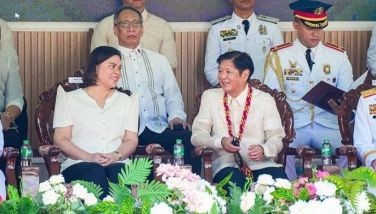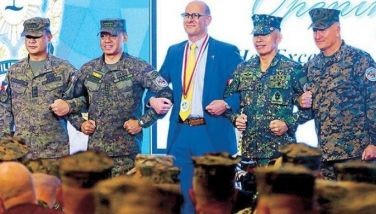Aquino explains strategy on sea dispute with China
PARIS – Global trade and freedom of navigation are great equalizers, President Aquino maintained Thursday as he was grilled on the country’s options on the West Philippine Sea and China’s increasingly aggressive behavior in the disputed areas.
He conceded the Philippines lacks the military might to fight for its sovereignty and territorial integrity, but the use of force should be out of the question because international laws and other mechanisms have been established to settle disputes peacefully.
Aquino said Manila has been a responsible member of the international community and has proven to be a profitable market for bigger economies like China and France.
He said every country must strive to reduce tensions rather than heighten them and cause instability.
He expressed belief that truth is on the side of the Philippines and peaceful means to assert one’s sovereignty and territorial integrity will prevail in the end.
“What are the Philippines’ options? When they say that they are worried about our intentions and the threat we pose, I point out that almost laughably, even if we were to engage in a boxing match with them, there are 13 of them for every one of us,” Aquino said, adding that the Philippines would rather spend its resources on building the lives of its people than boost its military capability.
“We talk about military might, the Philippines has tried in the debate between guns and butter... we have 132 ships roughly in our naval forces to guard 36,000 kilometers of coastline, let alone the EEZ (exclusive economic zone). They are not wooden sailing ships but they are World War II vintage.
“We have no fighter aircraft in our inventory, we have no bombers for that matter in our inventory. We are acquiring the skill sets again to be able to fly fighter jets... Now, if they do decide to attack us, and I don’t think and I have to be very clear about that, I couldn’t see the logic for them to do so, and there is no amount of spinning the story that will justify such an action,” Aquino said in a forum at Institut Francais des Relations Internationales (IFRI) or French Institute for International Relations.
He stressed the importance of having other countries speak up for peace, not to pit one country against another but to uphold the rule of law.
“If there are more voices that are saying, you know, we are happy around the world and we also feel threatened by these actions, and perhaps lending that voice will be an effective break before we get to a situation that nobody wants,” he said.
In 2011, Aquino said, he made a state visit to China and he agreed with then Chinese President Hu Jintao that the disputes in the waters were not the sum total of engagements between the two countries.
“They (Chinese) send to us about 200,000 tourists at that point in time. We send to them 800,000 tourists. They have a 1.3 billion population; we have, again, 100 million population, we just reached this number now. We have direct investments... $2.5 billion; they sent back to us about $600 million. So we asked, if all of our efforts are focused towards improving the lot of our people’s lives, tensions do not contribute to attaining that goal,” Aquino said.
“It is not only the Philippines that has tensions with them. We read the same media; we know exactly who has issues and tensions with them. They have the same goals and it cannot be attained if you increase instability in a region where one estimate says this particular body of water carries 40 percent of world commerce,” Aquino said.
The President said China has been asking to resolve the dispute bilaterally, but then multilateral and overlapping claims must be considered in order to come up with a binding and acceptable solution.
Aquino said the Philippines had been engaging China through the Association of Southeast Asian Nations and had gone to the arbitral tribunal on the basis of the United Nations Convention on the Law of the Sea to settle the dispute through peaceful means.
“When we say international, there is a convention adopted by the UN Convention on the Law of the Sea to which both China and ourselves and other claimants countries are party to that and have ratified,” the President said.
“The bottom line is we in this document have agreed on duties, specific duties, obligations and entitlements and if, at any point in time, any particular state can unilaterally say, when this agreement that took so long to build can be abrogated without actually abrogating it. Then one perhaps should really wonder what is in store for the rest of humanity,” Aquino said.
Pattern of aggression
“The Philippines has consistently expressed its concern on rising tensions in our part of the world, due to maritime and territorial disputes in the South China Sea. As has been reported by international news agencies the world over, there is an emerging pattern of aggression bent on establishing new realities at sea and in the air.
“These violations of international law pose a danger not only to claimant countries, but also to the entire international community, since freedom of navigation and unimpeded lawful commerce are threatened,” Aquino said.
“My father once said, if you tolerate the abuse of the rights of one, it sets the stage for the abuse of your own rights. As responsible members of the international community, it is our duty to uphold the rule of law in every instance, and to reject might and power when they seek to subvert the rule of law,” Aquino said.
“This is why we are advocating a peaceful resolution of the dispute. To do this, we are taking two tracks: first, through promoting the formulation of a binding code of conduct, and second, through arbitration – a mechanism embedded in the United Nations Convention on the Law of the Sea. We continue to invite other claimant countries to join us, to accelerate the resolution of this very long standing dispute, which has lately caused much tension in the region,” he added.
Aquino said the international community as a whole would stand to gain when the rule of law is upheld.
“Indeed, history has shown us how events halfway around the world can have a profound effect on our shores; no one can deny that our destinies are intertwined,” he said.
- Latest
- Trending
































